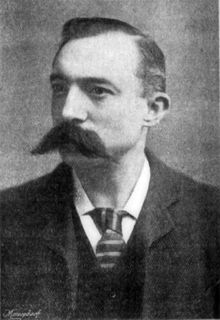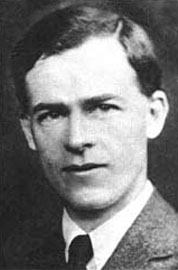
Friedrich Engels was a German philosopher, historian, communist, social scientist, sociologist, journalist and businessman. His father was an owner of large textile factories in Salford, England, and Barmen, Prussia.

The Independent Labour Party (ILP) was a British political party of the left, established in 1893, when the Liberals appeared reluctant to endorse working-class candidates, representing the interests of the majority. A sitting independent MP and prominent union organiser, Keir Hardie, became its first chairman.

"Merry England", or in more jocular, archaic spelling "Merrie England", refers to an English autostereotype, a utopian conception of English society and culture based on an idyllic pastoral way of life that was allegedly prevalent in Early Modern Britain at some time between the Middle Ages and the onset of the Industrial Revolution. More broadly, it connotes a putative essential Englishness with nostalgic overtones, incorporating such cultural symbols as the thatched cottage, the country inn and the Sunday roast.

Robert Peel Glanville Blatchford was an English socialist campaigner, journalist, and author in the United Kingdom. He was also noted as a prominent atheist, nationalist and opponent of eugenics. In the early 1920s, after the death of his wife, he turned towards spiritualism.

George Douglas Howard Cole was an English political theorist, economist, writer and historian. As a libertarian socialist, he theorised guild socialism. He belonged to the Fabian Society and was an advocate for the co-operative movement.

Jenny Julia Eleanor Marx, sometimes called Eleanor Aveling and known to her family as Tussy, was the English-born youngest daughter of Karl Marx. She was herself a socialist activist who sometimes worked as a literary translator. In March 1898, after discovering that Edward Aveling, her partner and a prominent British Marxist, had secretly married a young actress in June of the previous year, she poisoned herself at the age of 43.
Use value or value in use is a concept in classical political economy and Marxian economics. It refers to the tangible features of a commodity which can satisfy some human requirement, want or need, or which serves a useful purpose. In Karl Marx's critique of political economy, any product has a labor-value and a use-value, and if it is traded as a commodity in markets, it additionally has an exchange value, most often expressed as a money-price.

Laurence Gronlund was a Danish-born American lawyer, writer, lecturer, and political activist. Gronlund is best remembered for his pioneering work in adapting the International Socialism of Karl Marx and Ferdinand Lassalle to the American idiom in his popular 1884 book, The Cooperative Commonwealth, and for his influence upon the thinking of utopian novelist Edward Bellamy, newspaper publisher Julius Wayland, and the American socialist movement of the 1880s and 1890s.

William Hurrell Mallock was an English novelist and economics writer.

Socialism: Utopian and Scientific is a short book first published in 1880 by German-born socialist Friedrich Engels. The work was primarily extracted from a longer polemic work published in 1876, Anti-Dühring. It first appeared in the French language.

Henry Hyde Champion was a socialist journalist and activist, regarded as one of the leading spirits behind the formation of the Independent Labour Party. Up to 1893, he lived and worked in Great Britain, moving after that date to Australia.
The Clarion was a weekly newspaper published by Robert Blatchford, based in the United Kingdom. It was a socialist publication with a Britain-focused rather than internationalist perspective on political affairs, as seen in its support of the British involvement in the Anglo-Boer Wars and the First World War.
John Bellers was an English educational theorist and Quaker, author of Proposals for Raising a College of Industry of All Useful Trades and Husbandry (1695).
Maurice Eden Paul was a British socialist physician, writer and translator.
Alexander Mattock Thompson, sometimes credited as A. M. Thompson, was a German-born English journalist and dramatist. From the 1880s, Thompson wrote for socialist newspapers and journals, co-founding The Clarion in 1891. He became an important librettist of Edwardian musical comedies in the early 20th century.
Ernest Edwin Williams was a Welsh journalist, author and barrister.

Das Kapital, also called Capital. A Critique of Political Economy, is a foundational theoretical text in materialist philosophy, economics and politics by Karl Marx. Marx aimed to reveal the economic patterns underpinning the capitalist mode of production in contrast to classical political economists such as Adam Smith, Jean-Baptiste Say, David Ricardo and John Stuart Mill. While Marx did not live to publish the planned second and third parts, they were both completed from his notes and published after his death by his colleague Friedrich Engels. Das Kapital is the most cited book in the social sciences published before 1950.

Marxian economics, or the Marxian school of economics, is a heterodox school of economic thought. Its foundations can be traced back to the critique of classical political economy in the research by Karl Marx and Friedrich Engels. Marxian economics comprises several different theories and includes multiple schools of thought, which are sometimes opposed to each other, and in many cases Marxian analysis is used to complement or supplement other economic approaches. Because one does not necessarily have to be politically Marxist to be economically Marxian, the two adjectives coexist in usage rather than being synonymous. They share a semantic field while also allowing connotative and denotative differences.

Frederick Parkin Hammill was a British trade union activist, and a co-founder of the Independent Labour Party.

The following outline is provided as an overview of and topical guide to Marxism:













